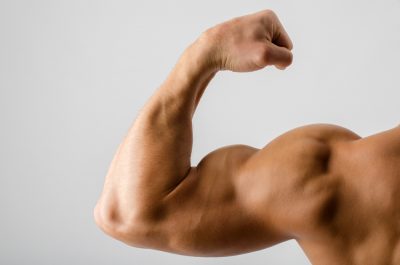Having low testosterone levels can affect your mental health, energy, muscle mass, sex drive, and more. If you have low testosterone levels, you need exercise and improve your intake of testosterone boosters.
Exercise helps boost and retain testosterone levels. Hence, you need to follow various types of exercises that are more effective in increasing your testosterone level compared to others. By adding exercise to your routine and testosterone-boosting foods diet, you promote:
- Weight maintenance
- Muscle Building
In this article, we will study the relationship between testosterone and your body muscle in-depth.
What is Testosterone?
Testosterone is an essential hormone produced in both men and women. In men, testosterone is formed in testicles, and for women, the adrenal glands and ovaries release the hormone. Testosterone is important for the development of masculine characteristics and male growth.
However, women’s bodies produce small amounts of testosterone. During early adulthood and adolescence, the production of testosterone increases by 30 times. In men, levels of testosterone drop slightly in the body after adulthood.
Testosterone is vital for:
- Quality of life and mood
- Sex drive
- Bones and muscle mass
- Pubic and facial hair
- Development of the body’s deeper voice
- Thinking ability and verbal memory
You need to visit your doctor to check if your testosterone is low. You also need to know that reducing testosterone levels is natural as you age. Some symptoms of low levels are erectile dysfunction, increased body fats, decrease in muscle mass and much more.
If you are diagnosed with hypogonadism, or low testosterone levels or need testosterone replacement therapy for any other medical condition, you should look for natural ways to increase levels, such as testosterone boosters.
But if you already have normal levels, increasing them will not give you additional benefits. Here are some major benefits of having balanced testosterone levels for men.
Benefits of Increasing Your Levels of Testosterone
Healthy Blood and Heart
Your heart circulates blood throughout the body, effectively providing your organs and muscles with oxygen, which is important for proper performance.
Testosterone helps in the production of red blood cells through the bone marrow. With low testosterone levels, you are at risk of developing various cardiovascular diseases.
The study on the effect of testosterone replacement therapy on heart disease (Source) shows mixed results. In the early 2000s, researchers performed various studies and suggested that men with heart diseases had slight improvements after testosterone therapy. Some men were also able to increase the distance during their walking routine by 33 percent.
A recent study involving 83,000 men found that men with a normal level of testosterone had a 24 percent less chance of getting a heart attack, and were 36 percent less likely to have a stroke. (Source)
More Muscle, Less Fat
 Testosterone is also important to develop muscle mass. Men with a leaner mass on their body have better control over their weight and increase in their energy.
Testosterone is also important to develop muscle mass. Men with a leaner mass on their body have better control over their weight and increase in their energy.
Studies show that men with lower testosterone levels were able to increase muscle strength and size and decrease fat in their bodies after treatment (Source).
Some were also reported with a change in their lean body mass and no increase in their strength. You will find more benefits if you combine exercise and strength training with testosterone therapy.
Stronger Bones
Testosterone is also important to increase mineral density in bones. The bone density decreases as men grow older, and testosterone drops. This increases the risk of weak bones and osteoporosis.
With strong bones, your internal organs and muscles get support, boosting your athletic performance. You can increase the density of your bone by treating testosterone with a high dosage.
As per a clinical trial, the effect of the testosterone increases bone density in the hip and spinal regions of the body (Source). Another study shows that the transition from female to male testosterone plays a major role in bone density (Source). However, it is still not known if testosterone helps in reducing the risk of fracture.
Better Mathematical Reasoning, Spatial Abilities, or Verbal Memory
Some research shows that men with a higher ration of testosterone have a lower risk of getting Alzheimer’s disease. There is also a strong impact of testosterone levels on thinking abilities, such as faster processing speed and verbal memory.
Men between 34 to 70 years have also shown improvement in their spatial memory after testosterone therapy.
Better Libido
Testosterone levels naturally increase in response to sexual activities and arousal. Men with balanced testosterone levels enjoy healthy sex life.
As men grow older, they may need testosterone supplementation for erectile function and libido. But you should know that erectile dysfunction may also be due to any other medications or conditions, and not low testosterone levels.
Studies also show that your sexual performance and health can benefit from testosterone therapy (Source). Furthermore, it shows that there is a limit on the maximum level of testosterone before you see an increased response (Source).
Men who don’t experience hypogonadism will not find any improvement in libido with increasing testosterone levels.
Improved Mood
A low level of testosterone is associated with poor quality of life. Some symptoms of low testosterone levels include irritability, fatigue and depression.
Although according to some research, these symptoms are limited to men with hypogonadism (Source). Men with a normal decrease in testosterone levels do not show any increase in depression.
Boosting your testosterone levels can also be effective for improving psychological health. However, testosterone replacement therapy has different effects on mood.
But most men have found a reduction in irritability and fatigue and improvement in well-being and mood after taking testosterone treatment (Source).
Relationship Between Testosterone and Muscles
The equation is really simple. Balanced testosterone levels help in building muscle, and low levels convert muscle into fat. With testosterone, it is possible to develop a mass of the muscles and helps in maintaining the physique.
When your body has low testosterone levels, the remaining testosterone converts into estrogen, which is another hormone. Estrogen puts fat around your belly and on your chest.
Low Testosterone Can Cause Muscle Loss
Loss of muscle or muscle wasting is a clear sign of low testosterone. But before muscle wasting, you may feel less energy in the body, along with weakness.
There are androgen receptors in the muscle cells for testosterone. When testosterone combines with these receptors, your muscle fibers develop, and low testosterone levels prevent this maintenance and degrade muscles.
According to a review about low testosterone, especially in obese men, it was found that with low testosterone levels, fat is deposited in the body, mostly in the belly. Some fat cells produce an enzyme called aromatase. This enzyme changes testosterone into estrogen.
After that, estrogen deposits more fats in the region such as thighs, hips, and chest. Increasing body fat reduces testosterone further, and the cycle goes on. With low testosterone, you may feel fatigued, depressed, and lethargic, which keeps you away from exercise to build muscle and loss fat.
Testosterone and Muscle Mass
 People lose their stamina and strength. The process of aging normally includes losing flexibility, strength, and muscle mass. This can be irritating and frustrating. But women and men experience the aging process differently.
People lose their stamina and strength. The process of aging normally includes losing flexibility, strength, and muscle mass. This can be irritating and frustrating. But women and men experience the aging process differently.
In young men, testosterone is responsible for building muscle strength and mass. When men grow older, their testosterone production levels naturally decrease, which results in a loss of muscle strength and mass, and low self-esteem.
Research has discovered that men with a high level of testosterone at an older age had less muscle loss.
When you regain testosterone level, you maintain muscle strength, effectively preventing many pitfalls of aging. That includes a lack of balance, broken bones, and other conditions.
By maintaining your testosterone levels, your body will feel young and fit, just like in your golden days. However, with low levels, along with muscle loss, you will also experience issues such as bone loss, a change in sleeping patterns, and fatigue.
Conclusion
You need to focus on working out your muscles. Join a gym and consult a trainer so that you can build a better routine. Cardio is also beneficial, but you cannot boost testosterone levels with cardio as with strength training.
Do not overdo the exercises. With excessive exercise, your testosterone levels can deplete rather than increase.
When you are asleep, your testosterone levels rise. The levels are at a peak when you are dreaming and stay up until you are awake. But levels during day time can drop by 15% on five hours of sleep. Try to take at least seven to eight hours of sleep every night.
You can also start taking natural testosterone boosters when you are low on your testosterone. But always look for the products with natural boosters.
You can choose between a lot of brands in the market, but only a few contain natural ingredients that your body requires for testosterone production. The best part is you do not have to take these boosters forever. Simply taking them for a few weeks or months will be enough for your body.








COMMENTS